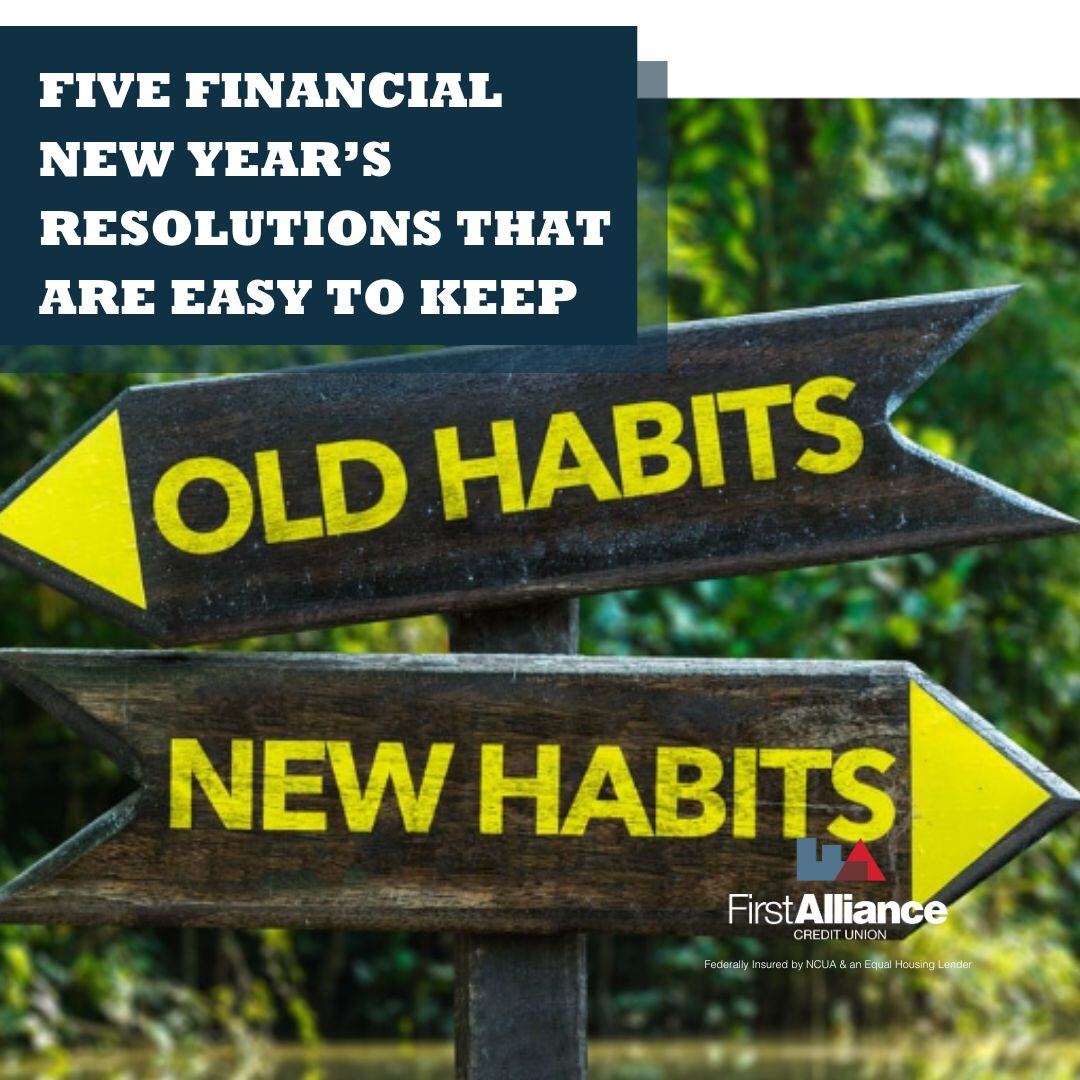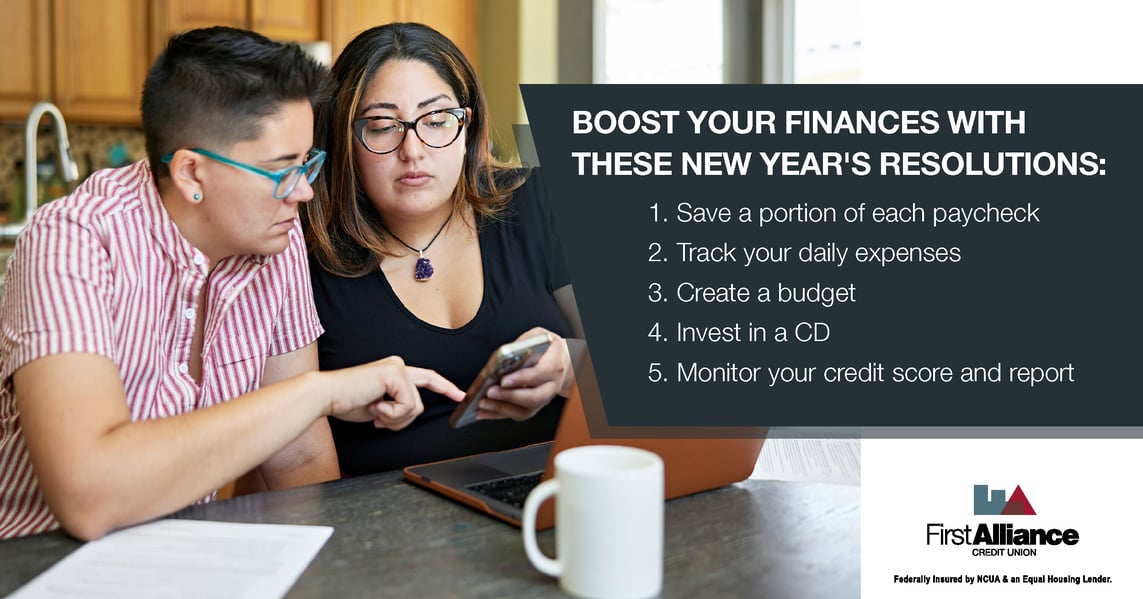7 Surprising Examples Of Financial Goals To Set During New Years
If your New Year's resolutions involve money, you're not alone. According to one report, nearly half of Americans are making finance-related...
3 min read
 Chris Gottschalk
:
Jan 8, 2019 6:04:00 AM
Chris Gottschalk
:
Jan 8, 2019 6:04:00 AM

Why do so many New Year’s Resolutions fail? Most of us just try to do too much too fast. People who want to lose weight, for example, sign up for a gym membership and draw up a meal plan in January, and then promptly get overwhelmed and retreat to the safety of their old routine.
![]() Instead of making these grand gestures, experts recommend you make gradual, small changes so you don't get too far out of your comfort zone. Make one small change every week. After only three weeks, you’ll notice you’ve made progress toward your financial goals.
Instead of making these grand gestures, experts recommend you make gradual, small changes so you don't get too far out of your comfort zone. Make one small change every week. After only three weeks, you’ll notice you’ve made progress toward your financial goals.
With that in mind, we’ve put together a list of five financial New Year’s Resolutions that won’t upend your day-to-day life. Even better, they’ll have an immediate impact on your financial health.

Most people talk about wanting to save more money, but ask them exactly how they’re going to save more and suddenly they’d prefer to talk about the weather instead. Coming up with ways to save is difficult, especially when it feels like you have to spend most of your paycheck on bills, rent and groceries.
The solution is to pay yourself before you pay everyone else. If you feel as though you have too many expenses to do this, try a simple experiment. Calculate 15% of your paycheck, and then set up an automatic transfer from your checking account to your savings account for that amount every time your paycheck gets deposited.
Most of the time, you’ll never miss this money. Even better, after a few months you’ll be surprised at how much money is sitting in your savings account, and in the long run you can potentially save thousands of dollars.
Creating a budget has several well-documented benefits, including helping you put aside money for the things you want to do. Creating a budget is easy, and when you realize your first effort doesn’t have to be set in stone it’s a lot less daunting.
Financial experts have written volumes about how to create a budget, but at it's core you'll be following three basic steps:
Write down how much income you bring in every month.
List all your monthly expenses and write them down.
Separate your total expenses from your income, and make sure your expenses are less than or equal to the amount you make.
This is a great starting point to saving more money, not to mention goal setting. When you know where all your money goes, you'll be able to see what money you can free up to save for new things or build up your emergency fund. Even better, you can get a sense how how long you'll need to save for financial goals ranging from a yoga mat to new appliances.
It's also worth pointing out that a budget can even boost your mental health. When you know where your money is going each month, you won't spend so much time stressing over what you can and can't afford. It's also a great way to avoid giving into temptation and making an impulse buy.
Anyone who has tried to lose weight knows that the best way is to track everything you eat. Simply doing that will make you more conscious of what you’re eating and less likely to overindulge.
The same principle applies with finances. When you track what you spend, you become more mindful of how you’re spending your money. Thanks to several free apps out there, tracking your expenses is easier today than it has ever been, and if you're a First Alliance member, you can use the My Money tool in our online banking platform and mobile app for free!

Once you have a significant amount of money stored up in your savings account, put some of it to work for you. The easiest way to do this is invest in a Certificate of Deposit.
You have to have $500 in order to start a CD. You’ll also have to choose how long you want your money in the CD. You can leave it in for a short a time as six months or as long as two years, although the interest rate does get higher the longer you leave your money in.
Once you have your immediate finances under control, the final thing to do is monitor your credit score. You have your pick of several credit monitoring sites and apps, but you can also visit AnnualCreditCreport.com, which is the official site of the Consumer Finance Protection Bureau, and get a free annual credit report from the three major consumer reporting companies—Equifax, Experian and TransUnion. When you get your credit report, go through it and keep an eye out for any inconsistencies, especially if your credit score is lower than you think it should be.
Once you’re done, make a reminder to check your credit score again in three to four months. You’ll have an easier time fixing issues with your credit report the sooner you uncover them, which can be important if you ever want to get a loan.
To stick to your New Year's resolutions, set specific and achievable goals, create a plan with actionable steps, track your progress regularly, stay motivated by rewarding yourself for milestones, and surround yourself with supportive people who can hold you accountable.
These resolutions are just some of the basic steps you can take to improve your finances. Once you’re mastered these, take the next step and invest the cash you’ve saved. Contact Member Services at First Alliance Credit Union to have our expert team of advisors help you select the best way to make your money work for you. Happy New Year!

If your New Year's resolutions involve money, you're not alone. According to one report, nearly half of Americans are making finance-related...

For most of us, 2020 is a year most of us are only too happy to be done with. It’s been 12 long months of disease, disasters and strife, but 2021 is...

For most people, January is a time to prepare for the year ahead. The most popular way to do that is by making New Year's resolutions, but people...